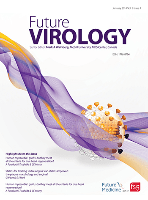
Future Virology
Scope & Guideline
Transforming Insights into Impactful Solutions
Introduction
Aims and Scopes
- Antiviral Research and Development:
The journal emphasizes the development of novel antiviral agents, therapies, and treatment strategies for various viral infections, including emerging and re-emerging viruses. - Viral Pathogenesis and Host Interaction:
Investigation into the mechanisms of viral infection, replication, and pathogenesis, alongside the host's immune response and genetic factors influencing susceptibility and disease outcomes. - Clinical Virology and Epidemiology:
Research on the clinical aspects of viral infections, including epidemiological studies, diagnostics, treatment outcomes, and public health implications. - Innovative Diagnostic Techniques:
Development and assessment of new diagnostic tools and methodologies for the detection and monitoring of viral infections. - Vaccine Development and Immunization Strategies:
Exploration of vaccine efficacy, safety, and development strategies for various viral pathogens, with a focus on innovative approaches and technologies. - Emerging Viral Threats and One Health Perspectives:
Addressing the public health implications of emerging viruses, zoonotic diseases, and the interconnectedness of human, animal, and environmental health.
Trending and Emerging
- COVID-19 Research and Long-Term Effects:
The ongoing research surrounding COVID-19, including long-term health impacts, vaccine efficacy, and therapeutic options, remains a dominant theme as the pandemic continues to evolve. - Innovative Therapeutics and Drug Repurposing:
There is an increased emphasis on the discovery and application of novel antiviral therapies, including drug repurposing strategies, particularly in response to the COVID-19 pandemic. - Genomic and Molecular Epidemiology:
Research focusing on the genomic characterization of viral pathogens and the epidemiological dynamics of viral spread is gaining traction, providing insights into transmission patterns and mutation rates. - Viral Immunology and Host Interaction Studies:
Emerging interest in understanding the complex interactions between viruses and host immune responses, including the role of host genetics in disease susceptibility. - Nanotechnology and Advanced Delivery Systems:
Exploration of nanotechnology applications in virology, particularly in drug delivery systems and vaccine development, is becoming increasingly relevant. - Public Health and Policy Implications of Viral Diseases:
Research addressing the broader implications of viral diseases on public health policy, vaccine distribution, and community health strategies is emerging as a critical area of focus.
Declining or Waning
- Traditional Antiviral Agents:
Research on older antiviral agents is becoming less frequent as newer therapies and innovative approaches gain traction. The focus is shifting towards developing novel compounds and therapeutic strategies. - Viral Infections in Non-Human Hosts:
Studies specifically targeting viral infections in animal models or non-human hosts have seen a decline, possibly as focus moves towards human-related health issues and zoonotic risks. - Basic Virology Studies:
There is a noticeable decrease in purely basic virology research that does not directly relate to clinical applications or emerging threats, as the journal aims to maintain a practical relevance. - Viral Infections in Specific Populations:
Research focusing solely on niche populations or specific demographics, such as rare infections in isolated communities, is less prevalent, indicating a broader focus on more generalizable findings.
Similar Journals

ARCHIVES OF VIROLOGY
Pioneering insights into virology's challenges.Archives of Virology is a prestigious academic journal dedicated to the field of virology, published by Springer Wien. Established in 1975, this journal has been a crucial platform for disseminating innovative research findings and advancements in the understanding of viral diseases and their impact on human health. It holds a notable position in the academic landscape, with a 2023 impact factor placing it in Q2 within the field of Medicine (miscellaneous) and Q3 in Virology. Its Scopus ranking within the Virology category further underscores its relevance, with a notable percentile of 45th. Although it does not provide Open Access options, the journal's rigorous peer-review process ensures the highest quality of published work, making it an essential resource for researchers, professionals, and students aiming to stay updated in the rapidly evolving field of virology. For those committed to advancing their understanding of viruses and viral diseases, Archives of Virology is a vital scholarly resource.

Virology Journal
Connecting researchers to enhance our understanding of virology.Virology Journal, published by BMC, stands as a prominent open-access platform since 2004, dedicated to advancing the field of virology and infectious diseases. With its E-ISSN: 1743-422X, this journal is based in the United Kingdom and strives to disseminate high-quality research that enhances our understanding of viral pathogens and their interactions with hosts. Recognized with a Q1 classification in the category of Infectious Diseases and a Q2 in Virology for 2023, Virology Journal holds significant standing in the academic community, ranking #82/344 in Medicine - Infectious Diseases and #26/80 in Immunology and Microbiology - Virology. Its commitment to open access ensures that cutting-edge research is freely available to researchers, professionals, and students worldwide, fostering collaboration and innovation in the fight against viral diseases. The journal aims to publish original research articles, reviews, and commentaries that will stimulate discourse and spark new ideas within the virology community.

ACTA VIROLOGICA
Innovative insights into viral pathogens and their impact.ACTA VIROLOGICA, a key journal in the field of virology and infectious diseases, is published by FRONTIERS MEDIA SA in Slovakia, serving the global scientific community with groundbreaking research since its inception in 1957. This esteemed journal, identified by ISSN 0001-723X and E-ISSN 1336-2305, provides a platform for rigorous peer-reviewed articles that contribute significantly to our understanding of viral pathogens and their implications in medicine. Positioned within the Q3 category for both Infectious Diseases and Miscellaneous Medicine, and a Q4 category for Virology in 2023, ACTA VIROLOGICA offers crucial insights into the evolving landscape of virology research. With its robust accessibility options, this journal appeals to a diverse readership, including researchers, healthcare professionals, and students, fostering a collaborative environment to advance the field of virology. The editorial objective is to enhance the catalog of knowledge pertaining to viruses, promoting innovative approaches in prevention, diagnostics, and treatment. Located at AVENUE DU TRIBUNAL FEDERAL 34, LAUSANNE CH-1015, SWITZERLAND, ACTA VIROLOGICA continues to be a vital resource in the collective efforts to combat viral disease challenges.
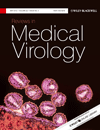
REVIEWS IN MEDICAL VIROLOGY
Illuminating the Pathways of Infectious Disease ScienceREVIEWS IN MEDICAL VIROLOGY is a premier academic journal published by Wiley, dedicated to advancing the field of virology and infectious diseases. Established in 1991, this journal has gained a reputable standing, holding a Q1 ranking in both Infectious Diseases and Virology as of 2023, with impressive Scopus rankings placing it at #17 out of 344 in the realm of Medicine - Infectious Diseases, and #8 out of 80 in Immunology and Microbiology - Virology. This reflects its substantial impact factor and contribution to ongoing research and scholarship. While it is not an Open Access publication, REVIEWS IN MEDICAL VIROLOGY offers vital insights and comprehensive reviews that cater to a diverse audience including researchers, healthcare professionals, and students pursuing knowledge in medical virology. The journal serves as a vital resource for understanding the complexities of viral pathogens and the evolving landscape of antiviral therapeutics, making it an essential read for those poised at the forefront of infectious disease research.
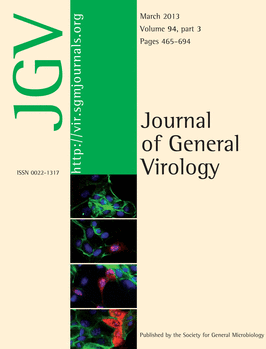
JOURNAL OF GENERAL VIROLOGY
Connecting researchers to the latest virology advancements.The JOURNAL OF GENERAL VIROLOGY, published by the Microbiology Society, is a premier academic journal dedicated to advancing the field of virology. Established in 1967, this influential journal covers a wide spectrum of research from basic virology to applied studies, serving as a vital resource for researchers, professionals, and students alike. With its ISSN 0022-1317 and E-ISSN 1465-2099, the journal is recognized for its rigorous peer-review process and high-quality publications, attaining a commendable Q2 ranking in the Virology category for 2023. The journal's focus on disseminating innovative findings and fostering critical discussions contributes significantly to the understanding of viral mechanisms, disease processes, and potential therapeutic strategies. Although it does not currently offer Open Access options, the journal remains accessible to the academic community, with a strong commitment to supporting virology research globally. As part of Scopus' top-tier rankings, illustrating its impact within the category of Immunology and Microbiology, the JOURNAL OF GENERAL VIROLOGY continues to play a pivotal role in shaping the future of virological science.
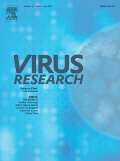
VIRUS RESEARCH
Driving excellence in infectious disease research.VIRUS RESEARCH is a leading journal dedicated to the field of virology, published by Elsevier, and has been a cornerstone for researchers, professionals, and students since its inception in 1984. With an impressive impact factor, the journal is highly regarded, holding a Q2 category ranking in both Cancer Research and Infectious Diseases, as well as in Virology for 2023. Based in the Netherlands, it publishes high-quality, peer-reviewed articles that explore the intricate relationships between viruses and their hosts, novel therapeutic strategies, and advancements in virus biology. Researchers will find that it ranks 49th in Medicine - Infectious Diseases and 19th in Immunology and Microbiology - Virology according to Scopus, signifying its significant contribution and relevance in the academic world. VIRUS RESEARCH facilitates a platform for sharing groundbreaking discoveries, forming a vital part of the global scientific community, making it an essential read for those involved in the study of viral pathogens and their implications in medicine and biochemistry.

Journal of Clinical Virology Plus
Innovating the landscape of clinical virology research.The Journal of Clinical Virology Plus, published by Elsevier, is an essential resource for researchers and professionals in the fields of virology and infectious diseases. Launched in 2021, this journal aims to bridge the gap between clinical research and application, fostering a deeper understanding of viral pathogenesis, diagnostics, and therapeutic strategies. With an ISSN of 2667-0380, this open-access journal brings cutting-edge findings to the global scientific community, facilitating the rapid dissemination of knowledge critical for advancing public health. Positioned in the Q3 category for both Infectious Diseases and Virology in 2023, its ranking reflects its growing influence and relevance in the academic landscape. The journal strives to support innovative research, collaborative studies, and comprehensive reviews that address contemporary challenges in clinical virology. As it converges through the years from 2021 to 2024, Journal of Clinical Virology Plus aims to be a central hub for vital discussions and breakthroughs in this dynamic field.

Viruses-Basel
Fostering Collaboration Through Cutting-Edge ResearchViruses-Basel, published by MDPI, is a leading interdisciplinary journal focused on the field of virology and infectious diseases, offering a platform for the rapid dissemination of high-quality research. Established in 2009, this open access journal has become an essential resource for researchers and health professionals, ensuring that critical findings are readily available to a global audience. With an impressive Q1 ranking in Infectious Diseases and a Q2 ranking in Virology as of 2023, the journal reflects its commitment to impactful research, validated by its notable positions within Scopus categories—ranked #84 out of 344 in Medicine: Infectious Diseases and #27 out of 80 in Immunology and Microbiology: Virology. The journal adheres to high standards of academic rigor, and by embracing an open access model, it promotes unrestricted access to scientific knowledge, fostering collaboration among researchers, professionals, and students alike. Situated in Basel, Switzerland, the journal serves as a cornerstone in the dissemination of research findings related to viral diseases and their implications on public health.
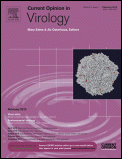
Current Opinion in Virology
Illuminating Trends and Challenges in Virology TodayCurrent Opinion in Virology, published by Elsevier Science Ltd, is a premier journal dedicated to advancing knowledge in the dynamic field of virology. Established as a respected source of comprehensive reviews and critical evaluations, this journal boasts an impressive impact factor and has achieved a distinguished Q1 category ranking for virology, signifying its pivotal role in the academic community. Serving researchers, professionals, and students alike, Current Opinion in Virology presents insightful contributions that delve into the latest developments, emerging trends, and pivotal challenges facing virology today. With its Scopus ranking placing it in the top 15% of its field, the journal provides unparalleled access to cutting-edge research that informs both basic and applied aspects of virology. Although not an open-access journal, it offers options for subscriptions that ensure accessibility to critical content. As the field continuously evolves, Current Opinion in Virology remains at the forefront, bridging the gap between research and clinical application, making it an essential resource for all in the virology community.

ANTIVIRAL RESEARCH
Driving Innovation in Antiviral ResearchANTIVIRAL RESEARCH, published by Elsevier, stands at the forefront of the study of antiviral agents and therapy, with a dedicated focus on advancing the understanding of viral infections and their mechanisms. The journal is recognized within the top tier of academic publications, belonging to the prestigious Q1 category in both Pharmacology and Virology as of 2023, ranking 12th out of 313 in Pharmacology and 11th out of 80 in Virology according to Scopus metrics, reflecting its significant impact in the field. With a long-standing history since its inception in 1959, it continues to serve as an essential platform for researchers and health professionals alike, sharing critical findings that drive innovation in antiviral therapeutics. Although it does not currently offer open access options, the journal’s rigorous peer-review process ensures that every published article meets high academic standards, providing invaluable insights for those dedicated to enhancing public health through virology research.